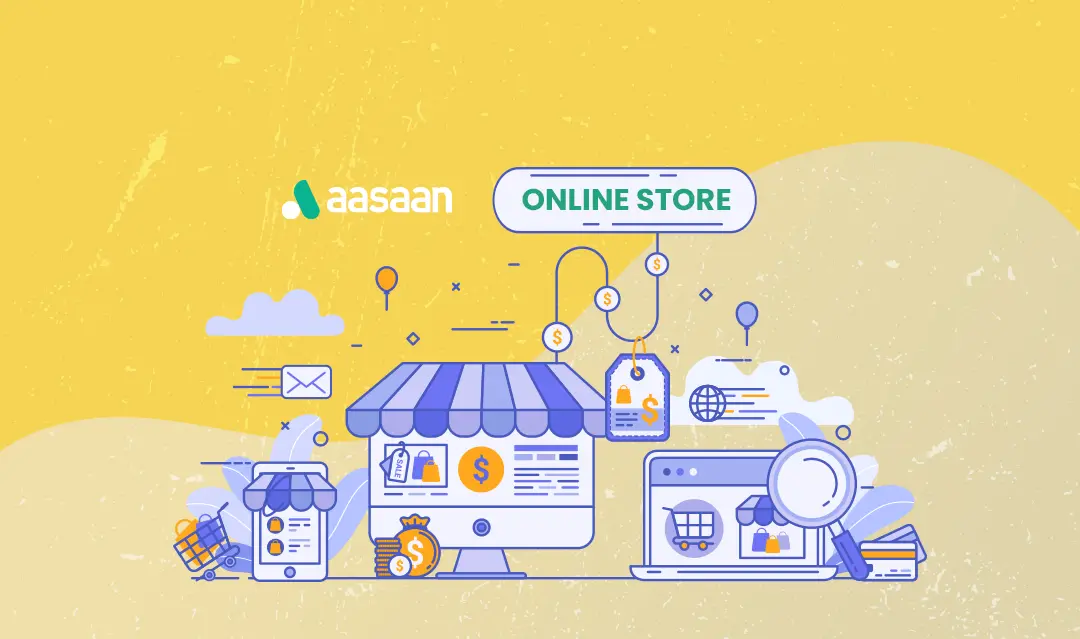.png)
8 Best Shopify Alternatives to Consider (Free, Paid, and Open Source) in 2025.
Feeling limited by Shopify’s high fees and rigid structure? You’re not the only one.
As ecommerce continues to grow, with sales expected to reach $6.3 trillion by 2025, many small business owners are searching for more adaptable and affordable alternatives.
Whether you’re a current Shopify customer looking for other options or just starting to research ecommerce platforms, we can help.
In this article, we’ll review the best Shopify alternatives & Competitors, including the pros and cons of each ecommerce solution, and explore why some business owners have migrated from Shopify to platforms like Aasaan.
Discover how these alternatives can enhance your online store’s potential and help your business thrive in the competitive digital marketplace.
What is Shopify?
Shopify is a comprehensive e-commerce solution that allows individuals and businesses to create and manage their online stores.
With its user-friendly interface, extensive app store, and robust payment processing options, Shopify has facilitated the entry of countless businesses into the online space. However, it’s not a one-size-fits-all solution.
Reasons You Need to Consider Alternatives to Shopify
1. Pricing
Shopify offers several pricing tiers, which can be a significant investment for startups or small businesses looking to minimize operational costs. While the basic features are accessible, scaling up can quickly become expensive as higher plans are required to access advanced features.
2. Third-Party Apps
The reliance on third-party apps for extended functionalities in Shopify can lead to increased costs and complexity. Each app may come with its own subscription fee, adding to the overall cost of running the store.
3. Steep Learning Curve
Although touted as user-friendly, mastering Shopify’s full range of features can be daunting for beginners. The platform requires a learning investment that might be cumbersome for those looking for a simpler, out-of-the-box solution.
4. Hidden Costs
Hidden costs in Shopify come in various forms, such as transaction fees if not using Shopify Payments, higher plan requirements for advanced features, and additional charges for many third-party apps. These can accumulate, affecting your bottom line.
5. Limited Customization
While Shopify is quite flexible, there’s a ceiling to customization unless you dive into more complex solutions like Shopify Plus, which involves liquid coding and can be out of reach for the average user without technical expertise.
6. Developer Costs
Hiring developers to customize your Shopify store can be costly. If your store requires significant customization beyond basic setup and maintenance, these costs can escalate quickly.
Top 8 Best Shopify competitors & alternatives to consider in 2025
1. Aasaan: The Next-Gen Best Shopify competitor overall
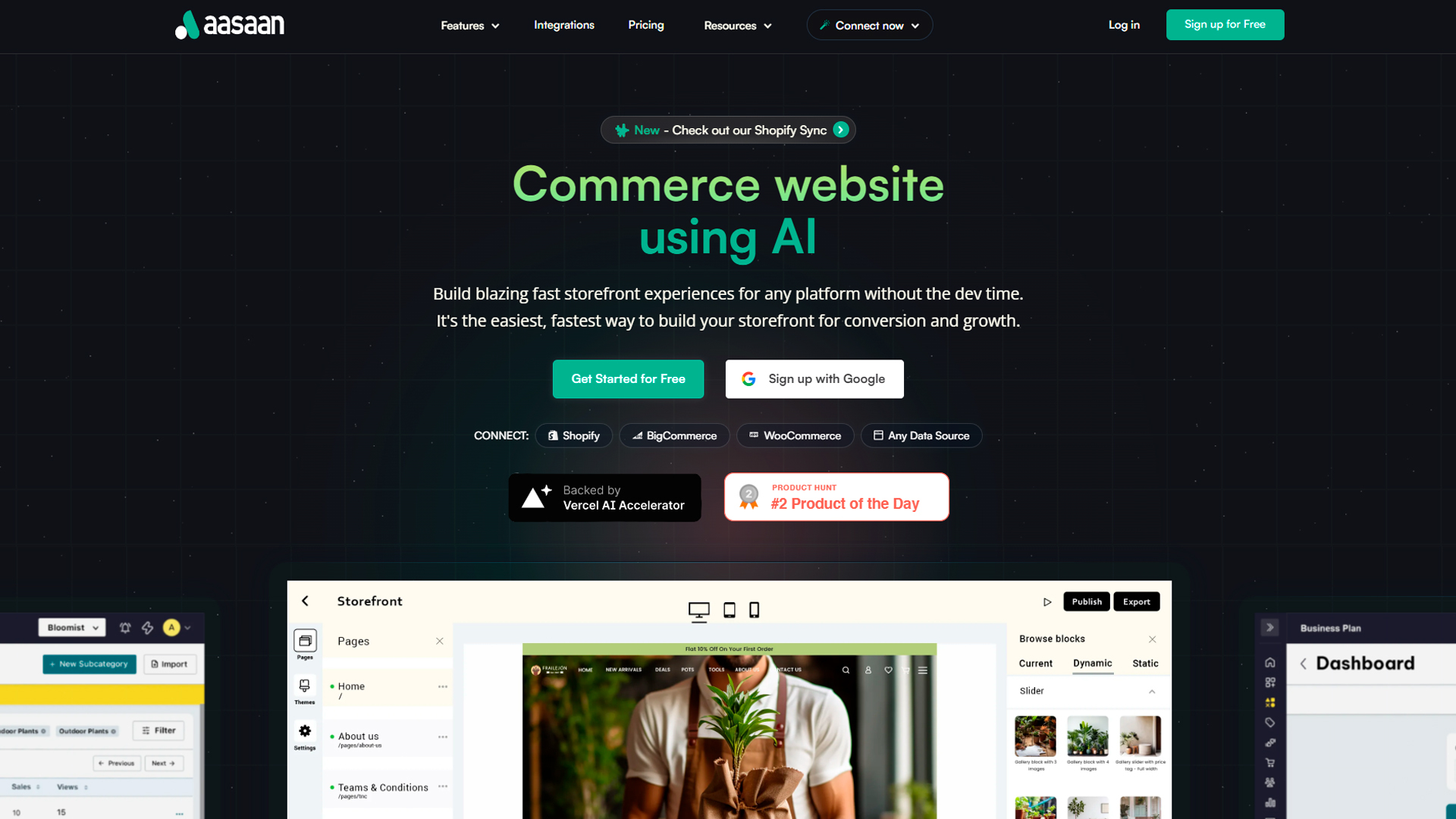
Aasaan is a AI No-code Headless SaaS platform designed for SMEs to build storefronts and mobile apps using a template-driven front-end.
It allows businesses to visually build next-generation shopping experiences without any coding.
Aasaan seamlessly integrates with your existing backend or starts with its API-first commerce platform, enabling you to create rich, dynamic shopping experiences.
Pros of Aasaan App
-
Effortless Online Storefront Creation: Aasaan offers a drag-and-drop storefront builder for easy, code-free online store setup.
-
Comprehensive E-Commerce Features: The platform supports all basic e-commerce functions, allowing users to sell products or services online.
-
Marketing and Promotion Tools: Built-in marketing tools on Aasaan include email campaigns, discounts, and promotions to attract and retain customers.
-
Inventory Management Capabilities: Efficient inventory management tools help track stock levels and send notifications for replenishments.
-
Mobile Management: Aasaan’s mobile app lets users manage their online stores from anywhere.
-
Analytics and Reporting Insights: Detailed analytics and reporting tools provide insights into sales trends and customer behavior.
-
Extended E-Commerce Integrations: Seamless integration with various third-party services enhances the platform’s e-commerce capabilities.
-
Inclusive Marketing and Pricing Strategies: Digital product promotion, bulk pricing, cross-selling, upselling, and email marketing are included without extra costs.
-
Seamless Social Media and Shopping Feed Integration: Aasaan allows easy setup of Instagram Shop and Google Shopping feeds with real-time synchronization at no additional cost.
-
Mobile Optimization: Aasaan App ensures that the online store created is optimized for mobile devices, catering to the growing mobile e-commerce market.
-
AI-Driven Content Creation: Aasaan incorporates advanced AI to streamline content creation, enabling the automatic generation of blogs and other digital content efficiently.
-
Customer Support Excellence: The platform ensures robust support with a 5-star customer service team ready to assist.
Cons of Aasaan App
-
Limited customization, while Aasaan App offers ease of use, it may have limitations in terms of customization options compared to platforms that allow more advanced coding or design customization.
-
Free plan includes branding.
-
Don’t support B2B
Pricing
-
Premium plan: For merchants and startups to help grow business with branding. It costs $50 per month if billed annually or $65 per month if billed monthly.
-
Business plan: Enables advanced merchants with advanced features. It costs $165 per month if billed annually or $200 per month if billed monthly.
-
Enterprise plan: Unlimited scalability, greater control, and dedicated resources for D2C brands to scale. It requires you to contact sales for a custom quote.
G2Review
Aasaan App has garnered positive reviews from its users for its robust platform and top-notch customer support service.
Users have praised the ease of integration, the ability to build custom shopping experiences, and the overall improvement in site performance.
Some users have mentioned the need for more templates and themes, but we are continually working to enhance our product offering, including more website builder options.
However, for a more unbiased review, it’s recommended to check out customer reviews on platforms like G2 ratings often reflect the best platform choices for businesses.
So, are you ready to take your online store to the next level with Aasaan? Book a Demo Now.
2. BigCommerce: A Scalable Best Shopify Alternative
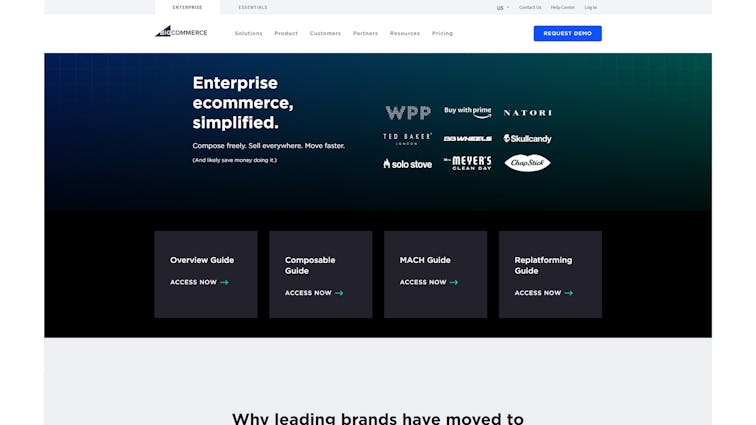
BigCommerce stands out as a robust alternative to Shopify, particularly favored by businesses looking to scale.
It offers a hosted eCommerce solution that simplifies the process of building and managing an online store without requiring extensive technical knowledge.
BigCommerce is designed to support a wide range of industries, including those with complex needs such as multi-channel retailing, international sales, and B2B transactions.
Pros of BigCommerce
-
Comprehensive Built-in Features: Unlike Shopify, where many essential features come from third-party apps that add to the cost, BigCommerce includes more advanced features out-of-the-box. This includes options for segmentation, search engine optimization (SEO), and multi-channel selling across Facebook, Instagram, and Google Shopping.
-
No Transaction Fees: One significant advantage is that BigCommerce does not charge any transaction fees, regardless of which payment gateway you use. This can result in substantial savings, especially for stores with high sales volumes.
-
Scalability: It’s designed to support large businesses as they grow. This makes it a good choice for medium to large enterprises or those planning to scale up quickly, positioning it as a best platform for growth.
-
SEO and Marketing Tools: BigCommerce provides excellent SEO capabilities and marketing tools that can help increase visibility and drive more traffic to your store.
Cons of BigCommerce
-
Complexity for New Users: The platform’s richness in features can also be a drawback for newcomers. The learning curve is steeper compared to Shopify, particularly for those without a background in e-commerce or digital marketing.
-
Limited Free Themes: While BigCommerce offers a selection of themes to choose from, only a handful are free. Premium themes can be quite costly, which might add up to the initial setup cost.
-
Customization Limitations: While there is significant scope for customization, some users feel that the creative freedom is still not as expansive as platforms that allow full control over the coding, like WordPress with WooCommerce.
Pricing:
The platform has three main plans: Standard, Plus, and Pro.
- Standard Plan: Standard costs $29/month and is for entrepreneurs making up to $50k/year.
- Plus Plan: Plus costs $79/month, made for small businesses earning up to $180k/year, illustrating its suitability for businesses of all sizes. Plus includes features like saving abandoned carts and storing credit cards.
- Pro Plan: Pro costs $299/month and is for growing businesses making up to $400k/year. Pro has extras like sorting products and customer reviews. There’s also an “Enterprise” plan for unlimited sales, customized for specific needs.
G2 Review:
BigCommerce is highly regarded on G2, scoring 4.2 out of 5 based on close to 500+ reviews.
Users appreciate its robust customization capabilities, no transaction fees, and excellent customer support, but note a steep learning curve for advanced features is required.
3. WooCommerce: Best Open source shopify Alternative
WooCommerce is a popular open-source eCommerce plugin for WordPress. It enables users to transform their WordPress sites into fully functional online stores.
The flexibility and extensibility of WooCommerce make it a top choice for businesses that already use WordPress and want to add eCommerce functionality.
Pros of WooCommerce
-
Flexibility and Customization: Being an open-source platform, WooCommerce offers unparalleled customization options. Users can modify and extend its functionality through thousands of plugins and themes available in the WordPress ecosystem.
-
Cost-Effective: The core WooCommerce plugin is free, which can significantly lower the entry cost for new and small businesses. While many extensions are paid, the initial cost can be much lower compared to other eCommerce platforms.
-
SEO Advantage: Since WooCommerce runs on WordPress, it benefits from WordPress’s robust SEO capabilities, making it easier for businesses to optimize their online store for search engines.
-
Large Community Support: With millions of users, the community support for WooCommerce is extensive. Users have access to numerous forums, blogs, and third-party developers who can provide assistance and custom solutions.
Cons of WooCommerce
-
Relies on WordPress: WooCommerce only works with WordPress. If you don’t already use WordPress for your site, setting it up just to use WooCommerce might not be the most efficient path.
-
Can Be Expensive to Scale: While the plugin itself is free, many essential add-ons are not. High traffic stores might also need advanced hosting plans to ensure optimal performance, which can increase the costs.
-
Security: Being open-source and highly popular, sites using WooCommerce can be targets for hackers. Regular updates and maintenance are required to keep the site secure.
-
Performance: As you add more plugins and extensions, the complexity can affect your website’s performance unless properly managed with quality hosting and caching strategies.
Pricing
The pricing for WooCommerce itself is free, as it is an open-source plugin. However, there may be additional costs associated with premium themes, extensions, and plugins.
Additionally, users will need to consider expenses related to web hosting, domain registration, and any other third-party services they choose to integrate with their WooCommerce store.
It’s recommended to visit the official WooCommerce website or consult with a web developer to get a comprehensive understanding of the pricing options and associated costs.
G2Review
On G2, WooCommerce is highly rated for its customizability and integration with WordPress. Users appreciate the vast number of plugins and themes, which allow for extensive customization of their stores to fit unique needs.
However, some reviews note that managing a WooCommerce store can require a bit of technical knowledge, especially when scaling up or optimizing for performance. Reviewers also mention that while the core product is free, costs can add up due to premium plugins and themes.
For more detailed user reviews and ratings, you can visit G2’s WooCommerce Reviews page.
4. Volusion: A User-Friendly Shopify Alternative
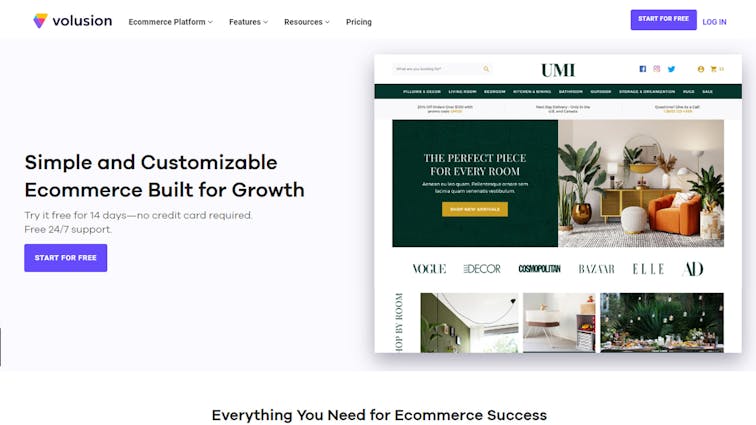
Volusion is a dedicated eCommerce platform that provides businesses with all the tools they need to build, manage, and expand their online stores.
Unlike open-source platforms, Volusion offers a more controlled environment which can be beneficial for users looking for a more out-of-the-box solution with less technical demands.
Pros of Volusion
- User-Friendly Interface: Volusion is known for its user-friendly dashboard and interface, which allows even beginners to easily manage their online store.
- Built-in Features: It comes with a range of built-in features including inventory management, payment collection, and customer management without the need for additional plugins or apps.
- Data Reporting: Comprehensive reporting tools are available directly within the platform, helping businesses track and analyze their sales, customer behavior, and more.
Cons of Volusion
- Limited Customization Options: Compared to platforms like WooCommerce or Shopify, Volusion offers fewer customization options. This can be a limitation for businesses looking to create a highly customized storefront.
- Bandwidth Limits: Volusion plans come with bandwidth limits, which can incur additional charges if exceeded. This is something not commonly found on other major eCommerce platforms.
- Fewer Integrations: Volusion has fewer third-party integrations available compared to its competitors, which might limit functionality for complex or very specific business needs.
Pricing
Volusion’s pricing is structured into several tiers to accommodate different business sizes and needs:
- Personal: Designed for smaller shops, starting at $29 per month with a bandwidth limit of 3 GB.
- Professional: Suitable for growing businesses, priced at $79 per month with a 10 GB bandwidth limit.
- Business: Aimed at larger businesses, this plan starts at $299 per month and includes 35 GB of bandwidth.
- Prime: Custom pricing for high-volume businesses that need more than what the predefined plans offer.
Each increase in pricing tier not only expands the bandwidth but also includes additional features like ratings and reviews, Amazon and eBay integration, and advanced report builder.
G2 Review
According to reviews on G2, users generally appreciate Volusion for its straightforward setup and ease of use, making it a great alternative to Shopify if you’re looking for simplicity.
However, some users feel that the design options are too limited and have mentioned the potential high costs associated with bandwidth overages. The lack of certain advanced features and integrations also appears in some user feedback as a point of contention.
For a more comprehensive look at what users are saying, you can explore G2’s Volusion Reviews to see a variety of perspectives from current and past users.
5. Magento (now Adobe Commerce)
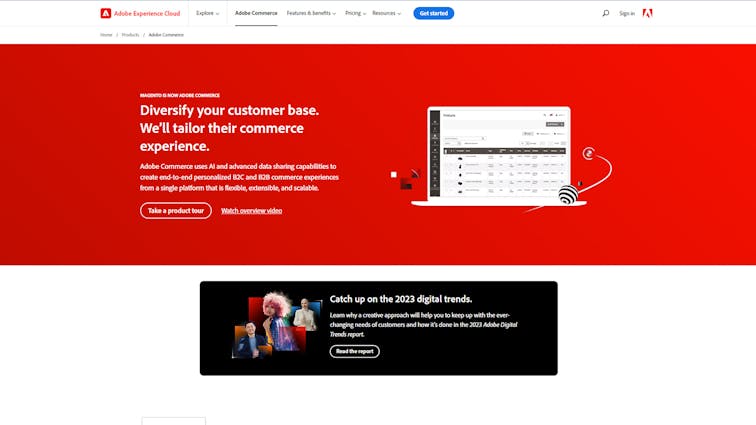
Magento, now rebranded as Adobe Commerce, stands as one of the best alternatives to Shopify. Renowned for its power and versatility, this open-source eCommerce platform is highly esteemed for its flexibility and scalability.
It caters particularly well to medium to large businesses seeking extensive customization options and possessing the resources to manage a more intricate system.
Pros of Adobe Commerce
- Highly Customizable: Adobe Commerce offers unparalleled customization options. Businesses can modify almost every aspect of their store to meet specific requirements, thanks to its open-source nature.
- Scalability: It is designed to handle large-scale eCommerce operations, making it ideal for growing businesses that expect to scale significantly.
- Strong Community and Developer Support: With a large community of developers and experts, users have access to a wealth of plugins, extensions, and professional advice.
- Robust Integration Capabilities: Adobe Commerce integrates well with third-party applications, including major ERP systems, payment gateways, and shipping services, facilitating comprehensive business solutions.
Cons of Adobe Commerce
- Complexity: Due to its extensive features and customization capabilities, Adobe Commerce can be quite complex to manage. It typically requires a higher level of technical expertise or a dedicated development team.
- Cost: While the open-source version is free, the enterprise version (Adobe Commerce) comes with a significant price tag, plus additional costs for hosting, development, and maintenance.
- Resource-Intensive: To run smoothly, Adobe Commerce demands robust hosting solutions, which can add to the overall operational costs.
Pricing
Adobe Commerce offers a quote-based pricing model that varies depending on the customer’s specific needs and business size.
The enterprise edition, designed for large businesses, requires a significant investment in both licensing and ongoing maintenance. Costs can range significantly but often start in the tens of thousands per year.
G2 Review
On G2, Adobe Commerce (Magento) is highly rated for its customizability and scalability, which are particularly valued by large retailers and businesses with complex needs. Users appreciate the wide range of functionalities and the ability to tailor the platform extensively.
However, some reviews highlight the platform’s steep learning curve and the need for significant developer resources. Users also note that managing and upgrading Magento can be costly and complex.
For more detailed reviews and ratings, you can visit G2’s Adobe Commerce Reviews to get a better understanding of what current users think about the platform and how it fits different business needs.
6. Wix: A Versatile Shopify Alternative
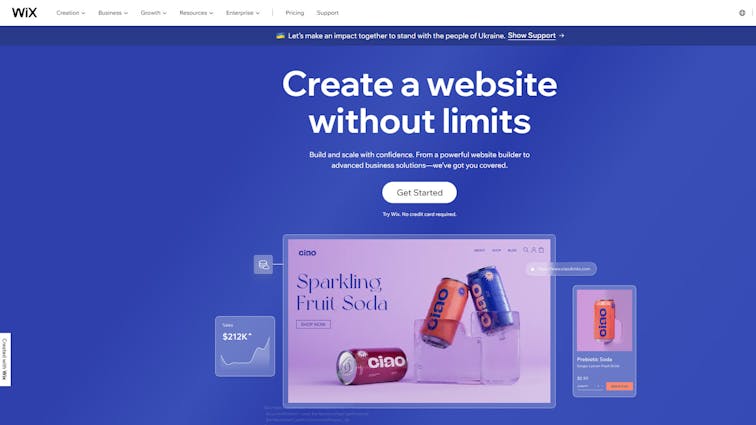
Wix stands out as a top-notch platform akin to Shopify, offering a supremely user-friendly experience. It empowers individuals and small businesses to craft stunning websites effortlessly through its intuitive drag-and-drop builder.
While primarily known for its capabilities in building general websites, Wix also offers robust eCommerce features, making it a viable choice for online stores.
Pros of Wix
- Ease of Use: Wix is best known for its intuitive drag-and-drop interface that makes website creation accessible even to those without any technical background.
- Design Flexibility: Wix offers a wide variety of templates and customization options, allowing users to design visually appealing sites without needing to code.
- All-in-One Solution: It provides a comprehensive set of tools, including hosting, custom domains, and eCommerce functionalities, all within the same platform.
- App Market: Wix has an extensive app market that enables users to enhance their sites with additional functionalities, such as social media integration, email marketing, and more.
Cons of Wix
- Less Scalability for Larger Operations: While suitable for small to medium-sized businesses, Wix might not be the best option for very large operations or those requiring highly complex customization due to its somewhat limited eCommerce capabilities compared to more dedicated platforms.
- SEO Limitations: Historically, Wix sites were criticized for their SEO capabilities, although improvements have been made. Some users still feel that it falls short compared to platforms built specifically with SEO in mind like WordPress.
- Platform Lock-in: Moving a site away from Wix to another platform can be challenging because it does not allow users to export data easily, potentially leading to lock-in.
Pricing
Wix offers a variety of pricing plans for 2025 that cater to different needs, from basic websites to advanced e-commerce platforms. Here’s a summary of their current offerings:
-
Light Plan: Priced at $16 per month when billed annually. This plan is suitable for portfolios and personal sites, providing basic functionalities without sales features. It includes 2GB of storage and allows for the connection of a custom domain without Wix branding on your site.
-
Core Plan: Costs $27 per month with annual billing. It’s designed for small online stores and growing businesses, offering more robust e-commerce features compared to the Light plan, though still basic in some respects. It includes 50GB of storage and additional capabilities like webchat for customer interaction.
-
Business Plan: Available at $32 per month when billed annually. This plan targets established businesses needing advanced e-commerce tools like automated sales tax calculations for 100 transactions per month, 100GB of storage, and the ability to handle multiple currencies. It also supports up to 1,000 product reviews and unlimited ‘Back in Stock’ notification.
-
Business Elite Plan: Costs $159 per month with annual billing. It’s geared towards large businesses requiring unlimited storage, advanced marketing and e-commerce tools, and priority customer support. This plan is suitable for businesses looking to expand significantly and can support complex operations.
-
Enterprise Plan: This plan offers custom pricing and is tailored for global brands and industry titans. It includes a dedicated account manager and access to a powerful, custom Wix editor designed for extensive, scalable business operations.
Additionally, Wix provides a free plan for those just starting out or wanting to test the platform. They also offer a 14-day free trial on all premium plans to give users a chance to explore the features before committing.
These plans reflect a strategic structuring to accommodate everything from individual creative projects to large-scale business operations, with scalability and functionality increasing at higher-tier plans.
G2 Review
On G2, Wix is generally well-reviewed for its user-friendly design tools and aesthetic flexibility. Users appreciate how easy it is to set up a site quickly. However, some reviews point out the platform’s limitations regarding more advanced functionalities and customizations.
Additionally, there are mixed feelings about Wix’s SEO capabilities, with some users noting improvements and others suggesting there’s still room for enhancement.
For more detailed insights, consider reading user reviews directly on G2’s Wix Reviews page. This will give you a broader understanding of what real users think about the platform, especially in terms of usability, performance, and customer service.
7. Ecwid: A Seamless Shopify Alternative
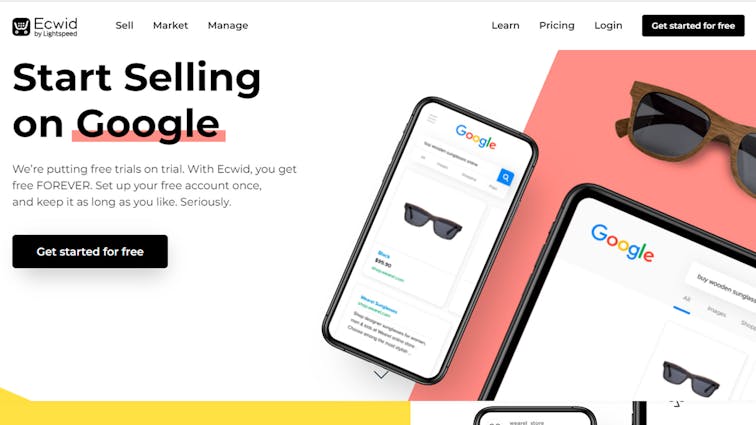
Ecwid emerges as a versatile e-commerce platform, serving as a good alternative to Shopify. It excels in seamlessly integrating an online store with any existing website or social media profile.
Renowned for its simplicity and plug-and-play nature, Ecwid becomes an excellent choice for small businesses or entrepreneurs seeking to commence online sales without the need to construct a new site from the ground up.
Pros of Ecwid
- Easy Integration: Ecwid can be seamlessly added to any existing website, blog, or social media channel. This allows users to sell across multiple platforms from a single Ecwid account.
- Mobile Optimization: All of Ecwid’s storefronts are fully responsive, meaning they automatically adjust to the screen size of any device, enhancing the shopping experience for mobile users.
- No Transaction Fees: Ecwid does not charge any additional transaction fees beyond what your payment gateway might charge, making it cost-effective for small businesses.
- Multi-Channel Selling: Users can sell simultaneously on multiple sites, including web, mobile, social media, and in-person with POS integration.
Cons of Ecwid
- Limited Design Options: Compared to more comprehensive e-commerce solutions like Shopify or BigCommerce, Ecwid has fewer customization options for its storefronts.
- Features Depend on the Plan: While Ecwid offers a free plan, many essential features, such as inventory management or advanced SEO tools, are only available in higher-tier plans.
- Limited Growth Scale: Larger businesses might find Ecwid’s features somewhat restrictive as they scale up, especially when compared to platforms designed for enterprise-level operations.
Pricing
Ecwid offers a range of pricing tiers to suit various business needs:
- Free Plan: Includes basic features for selling online and supports up to 10 items.
- Venture Plan: At $15 per month, this plan supports up to 100 products and includes access to advanced features like Google Shopping integration.
- Business Plan: Priced at $35 per month, it supports up to 2,500 items and adds app integrations and inventory management.
- Unlimited Plan: For $99 per month, it offers unlimited products, advanced e-commerce analytics, and priority support.
G2 Review
On G2, Ecwid receives positive reviews for its ease of use and excellent customer service. Users appreciate how quickly they can set up a fully functional online store without any technical expertise.
However, some reviews indicate that while Ecwid is great for small to medium-sized businesses, it might not be sufficient for larger businesses with more complex needs.
Users also note that while the free version is useful, scaling up requires investing in the paid plans to access more robust features.
For more detailed user reviews and to see how Ecwid compares to other e-commerce platforms, you can visit G2’s Ecwid Reviews for a comprehensive overview.
8. OpenCart: A Cost-Effective Shopify Alternative
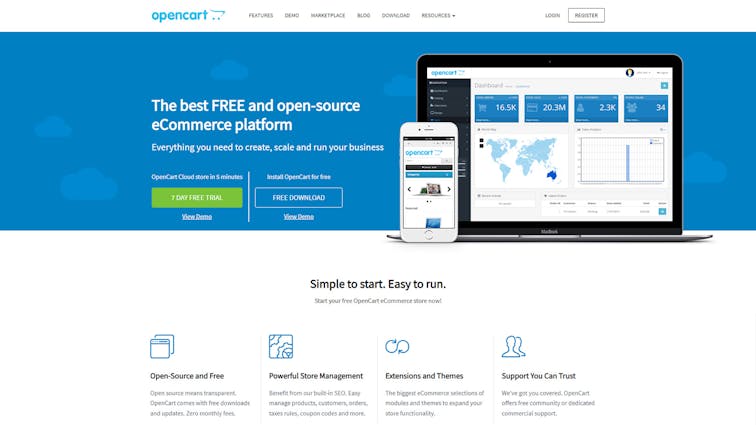
OpenCart is an open-source eCommerce platform that offers a flexible and scalable solution for online merchants of all sizes.
It is particularly known for its straightforward setup and user-friendly interface, which makes it an appealing choice for those with some technical knowledge who want to customize their online store.
Pros of OpenCart
- Affordability: OpenCart is a free, open-source e-commerce platform, making it a cost-effective option for small businesses.
- Customizability: OpenCart is highly customizable, with over 13,000 extensions and add-ons available in the marketplace.
- Multiple Payment Gateways: OpenCart supports a wide range of payment gateways, including PayPal and Sage Pay.
- Multiple Currencies: OpenCart supports multiple currencies, making it a suitable option for international businesses.
- Backup and Restoration Tools: OpenCart offers backup and restoration tools, ensuring data security.
- Unlimited Products and Categories: OpenCart allows users to create an unlimited number of products, categories, and subcategories.
- Multilingual Support: OpenCart is available in over 40 languages, making it accessible for businesses worldwide.
Cons of OpenCart
- Limited Native SEO and Marketing Features: OpenCart’s native SEO and marketing features are limited, requiring users to rely on paid extensions for enhanced customization.
- Requires Development Knowledge: OpenCart requires development knowledge for enhanced customization, making it less accessible for users with no coding experience.
- Cost of Extensions and Add-ons: Extensions and add-ons can become costly, increasing the overall cost of using OpenCart.
- Self-Hosting Maintenance and Security: OpenCart’s self-hosting nature requires users to manage maintenance and security, which can be challenging for non-technical users.
Pricing
OpenCart is free to download and use. The platform does feature a marketplace of both free and paid add-ons and extensions to increase functionality.
G2Review
On G2, OpenCart is praised for its flexibility and the control it offers over online store setups. Users appreciate the no-cost entry point and the variety of user-made extensions available.
However, some reviews highlight concerns over the platform’s steep learning curve for non-developers and occasional bugs that can arise with certain themes or extensions.
For a detailed perspective from current users, consider exploring G2’s OpenCart Reviews where you’ll find numerous insights into the advantages and drawbacks of using OpenCart for ecommerce projects.
Factors to consider when choosing a Shopify alternative?
When considering alternatives to Shopify for your e-commerce needs, it’s important to weigh several factors to ensure that the platform you choose aligns with your business requirements. Here are some key considerations:
-
Cost Effectiveness: Evaluate the total cost of ownership, including monthly or annual subscription fees, transaction fees, and any additional costs for necessary apps or extensions. Some platforms may appear cheaper but could have hidden costs that add up.
-
Ease of Use: Consider how user-friendly the platform is, especially if you’re not technically inclined. Some Shopify alternatives might offer more customization but could be more complex to set up and manage.
-
Features and Functionality: Assess whether the platform has all the features you need to run your online store effectively. This includes inventory management, SEO capabilities, marketing tools, and customer service features. Make sure the platform can scale with your business as it grows.
-
Customization Options: If your business has specific needs, look for a platform that allows significant customization. Open-source platforms typically offer more flexibility but might require more technical expertise to manage.
-
Integration Capabilities: Check if the platform integrates smoothly with other tools and services you use, such as email marketing software, CRM systems, and accounting tools. Seamless integration can significantly enhance efficiency and ease of operations.
-
Support and Community: Good customer support can be crucial, especially during the initial setup phase or when encountering issues. Also, a strong community around a platform can provide additional resources and help.
-
Mobile Responsiveness: With a growing number of consumers shopping on mobile devices, ensure the platform offers mobile-friendly themes and features to provide a seamless shopping experience on all devices.
-
Payment Gateways and Processing: Look at the payment solutions supported by the platform. It’s important that it supports a wide range of payment methods, including those popular in your target markets.
-
SEO and Marketing Tools: Since driving traffic is critical, evaluate the SEO features and marketing tools available. Good SEO features can help your store rank better in search results, attracting more organic traffic.
-
Security Features: Security is crucial in e-commerce. Ensure that the platform complies with the latest security standards and regulations to protect your data and your customers’ information.
By considering these factors, you can choose a Shopify alternative that best fits the needs of your business, supports your growth, and provides your customers with a great shopping experience.
Conclusion:
To recap, while Shopify is a leading platform for ecommerce, exploring alternatives can offer unique advantages that may better suit specific business needs.
We discussed the importance of considering factors such as cost-effectiveness, ease of use, features, and customization options when choosing a Shopify alternative. Each platform, from BigCommerce to OpenCart, provides different strengths and limitations, making it crucial to align your choice with your business objectives and operational style.
We covered the pros and cons of popular Shopify competitors like Aasaan, BigCommerce, WooCommerce, and others, emphasizing how each can serve different types of online stores.
Whether you require extensive customization capabilities, robust SEO tools, or superior customer support, there is likely an alternative that matches your requirements.
If you’re considering a switch or just starting out and need an ecommerce solution that differs from Shopify, revisit the detailed comparisons shared in this post. Evaluate what each platform offers against your business needs. And if you’re looking for more detailed guidance or have any questions, feel free to reach out or Book a demo with us.
Ready to make a choice? Explore more about these platforms to ensure your final decision supports your business’s growth and customer engagement goals effectively.
FAq’s on Best shopify competitors
1. What is the best alternative for Shopify?
There are several alternatives to Shopify, each with its own unique features and benefits. Some of the best alternatives include Aasaan, BigCommerce, WooCommerce, Wix, and Squarespace.
2. What Shopify alternatives don’t charge transaction fees?
Some Shopify alternatives that don’t charge transaction fees include Aasaan, BigCommerce, WooCommerce, and Wix. These platforms allow you to use your own payment gateway and avoid the additional fees.
3. Are there any free alternatives to Shopify?
While there are no completely free alternatives to Shopify, WooCommerce is a free and open-source platform that can be self-hosted, making it a cost-effective option for small businesses.
4. How much are Shopify fees?
Shopify fees vary depending on the plan you choose. The Basic Shopify plan starts at $29 per month, the Shopify plan starts at $79 per month, and the Advanced Shopify plan starts at $299 per month. Additionally, Shopify charges a 2% transaction fee for all sales made using external payment gateways.
5. What are the disadvantages of Shopify?
Some disadvantages of Shopify include the additional transaction fees for using external payment gateways, the limited customization options for certain templates, and the potential for slow response times from customer support. Additionally, some users may find the backend user interface confusing or overwhelming.




